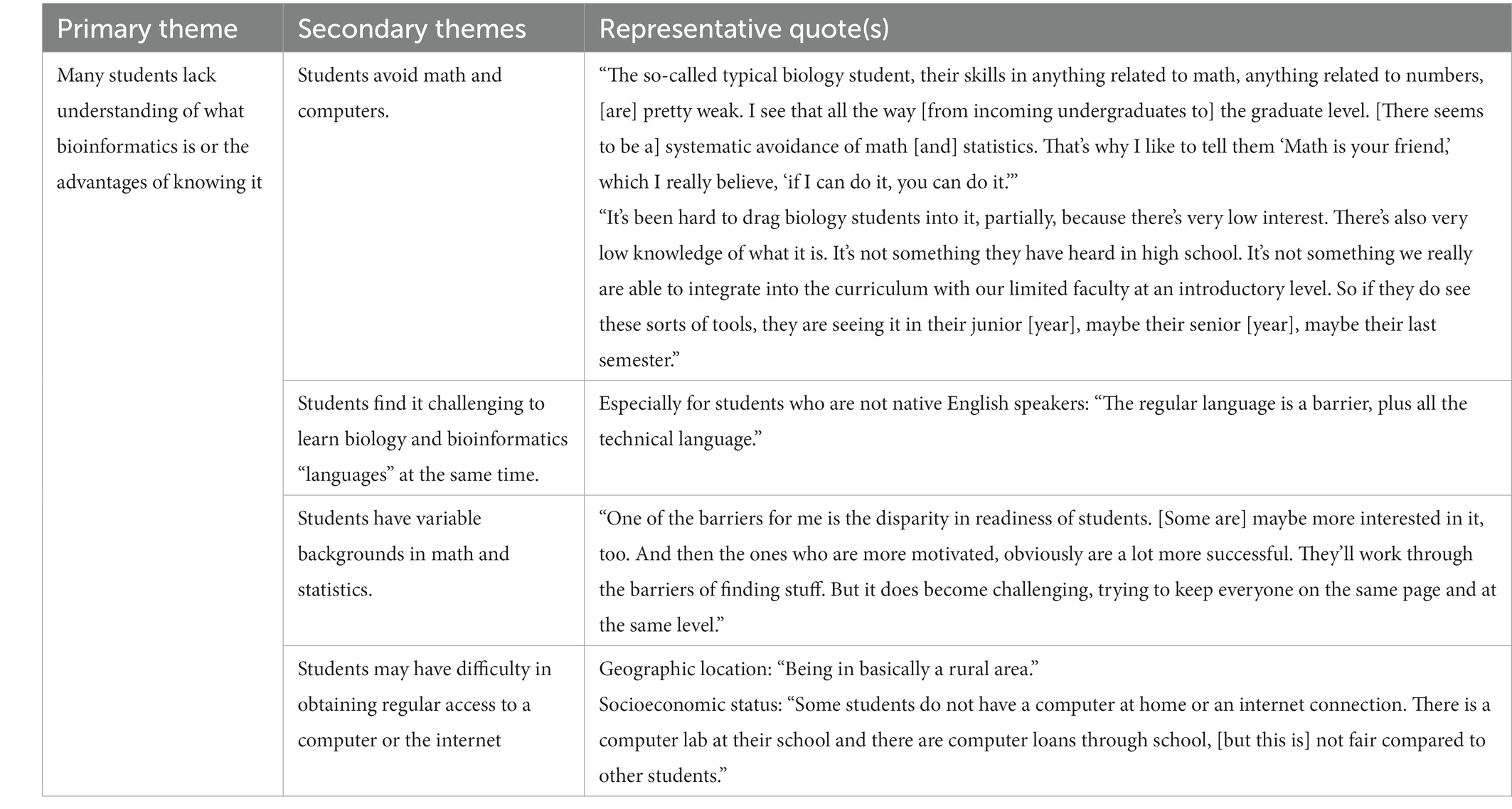The Buzz on Bioinformatics Tutor
The Buzz on Bioinformatics Tutor
Blog Article
The 8-Minute Rule for Bioinformatics Tutor
Table of ContentsThe 20-Second Trick For Bioinformatics TutorEverything about Bioinformatics TutorFacts About Bioinformatics Tutor UncoveredThe Single Strategy To Use For Bioinformatics TutorThe Buzz on Bioinformatics Tutor
Of the total individuals included in the training, 80% were pupils from public college organizations, while the remaining 20% came from personal institutions. To get approved for a certificate of participation, trainees were required to go to a minimum of 90% of the overall training hours. As an outcome of this demand, an impressive 95% of the participants effectively gotten their certificates, having not just satisfied the minimum attendance standards however also finished all assigned tasks throughout the training.
Throughout the elevation of the COVID-19 pandemic, specifically between June and August 2020, the job group was tasked with arranging specialized training in bioinformatics. This training was specifically intended at students from the research team Center for Study in Applied Computing at the Federal University of Pará (UFRA) The adjustment to remote learning platforms due to the pandemic created an opportunity to discover new teaching methods and electronic tools that improved both reach and efficiency.
This program was developed to give an available yet comprehensive review of Artificial Knowledge methods, particularly as applied in bioinformatics (Bioinformatics Tutor). This virtual style enabled engagement from students throughout Brazil, many of whom may not have had the chance to go to in-person sessions.
The Ultimate Guide To Bioinformatics Tutor
A notable attribute of this program was its emphasis on hands-on knowing. Around 50% of the overall training hours were dedicated to practical tasks where trainees built intelligent versions and applications in an array of scientific domain names, consisting of genetics, molecular biology, and environmental data evaluation. Widely utilized structures and tools such as Spyder, Google Colab, Jupyter Notebooks, and Orange were incorporated into the coursework. These systems enabled students to take part in real-time data manipulation, model training, and formula experimentation.
The program brought in 80 individuals in total amount. Sixty of them were associated with various greater education and learning establishments in the state of Pará, while the remaining twenty came from institutions located in 5 other Brazilian states. This wide geographical representation highlighted the national interest in bioinformatics and the growing need for specialized abilities around. By introducing Artificial Intelligence in a pertinent and functional context, the initiative offered to link the space in between concept and real-world application, offering pupils with a solid structure for future study or employment in the area.
The training campaign developed part of a more comprehensive scholastic outreach effort referred to as the Bioinformatics when traveling project. This task has, over the years, presented dozens of pupils to the globe of bioinformatics and computational biology. The More hints events held under this umbrella campaign have taken area throughout numerous areas and years, as summarized in Table 1 (List of occasions, areas, years, and total numbers of pupils and trainers)
One of one of the most exceptional results of the this link Bioinformatics on the Roadway initiative has been its payment to the development of decentralized study groups. Numerous of these groups, initially combined by their involvement in training occasions, have actually considering that taken place to produce independent scientific study in cooperation with regional scholastic establishments. The training not just promoted scientific thinking within the context of bioinformatics however likewise triggered joint connections that expanded past the training setting. These partnerships have caused raised regional scientific productivity and added meaningfully to the development of the more comprehensive bioinformatics area in Brazil.
The Buzz on Bioinformatics Tutor
The exact same group, omitting IH and RR, also acted as tutors for the sensible training components. Financing for the task was provided with the grant 88887.200562/ 2018-00 from CAPES.
The Federal University of Pará's Workplace of Research study (PROPESP/UFPA) additionally offered economic assistance, especially for the production of the last manuscript. The authors state no financial or business conflicts of rate of interest that could have influenced the research study. All opinions and analyses expressed in this short article are exclusively those of the writers and hop over to here do not necessarily reflect those of their particular institutions, the publisher, editors, or reviewers entailed in the publication procedure.

Not known Details About Bioinformatics Tutor
From a pedagogical point of view, the training strategy utilized in the training was intentionally interactive. Classes were carried out in a manner that encouraged trainee involvement and conversation, exceeding rote memorization to explore how concepts are established, applied in day-to-day live, and checked in scholastic settings. The instructional viewpoint concentrated on nurturing both strong and battling pupils, offering individualized assistance, and building self-confidence via continual mentorship and perseverance.

Each group, including about 36 participants, was supported by 3 advisors-- the majority of whom were postdoctoral scientists with specialized experience. These coaches not only assisted create the team jobs yet also promoted their execution, making sure that each research study inquiry was both appropriate and appropriately tough. The objective was to give a biologically sensible context that individuals could explore via open-ended purposes and accessibility to curated datasets.
For added insights right into the methodology and results of this project-based understanding method, readers are guided to S1 Text, that includes thorough descriptions of the instructional framework, assessment strategies, and job themes made use of in the training sessions.
10 Simple Techniques For Bioinformatics Tutor
Of the total amount participants entailed in the training, 80% were trainees from public higher education institutions, while the staying 20% came from private organizations. To certify for a certificate of participation, trainees were needed to participate in at the very least 90% of the total training hours. Notably, beyond the pupils that enlisted in the training sessions, seven skilled instructors got involved in supplying the courses, while 3 devoted research professors worked with the overall training procedure. Around 50% of the complete training hours were dedicated to sensible tasks where pupils built smart models and applications in an array of clinical domains, consisting of genetics, molecular biology, and ecological data evaluation. The training not only cultivated scientific thinking within the context of bioinformatics yet also stimulated collective relationships that extended past the training environment.
Report this page